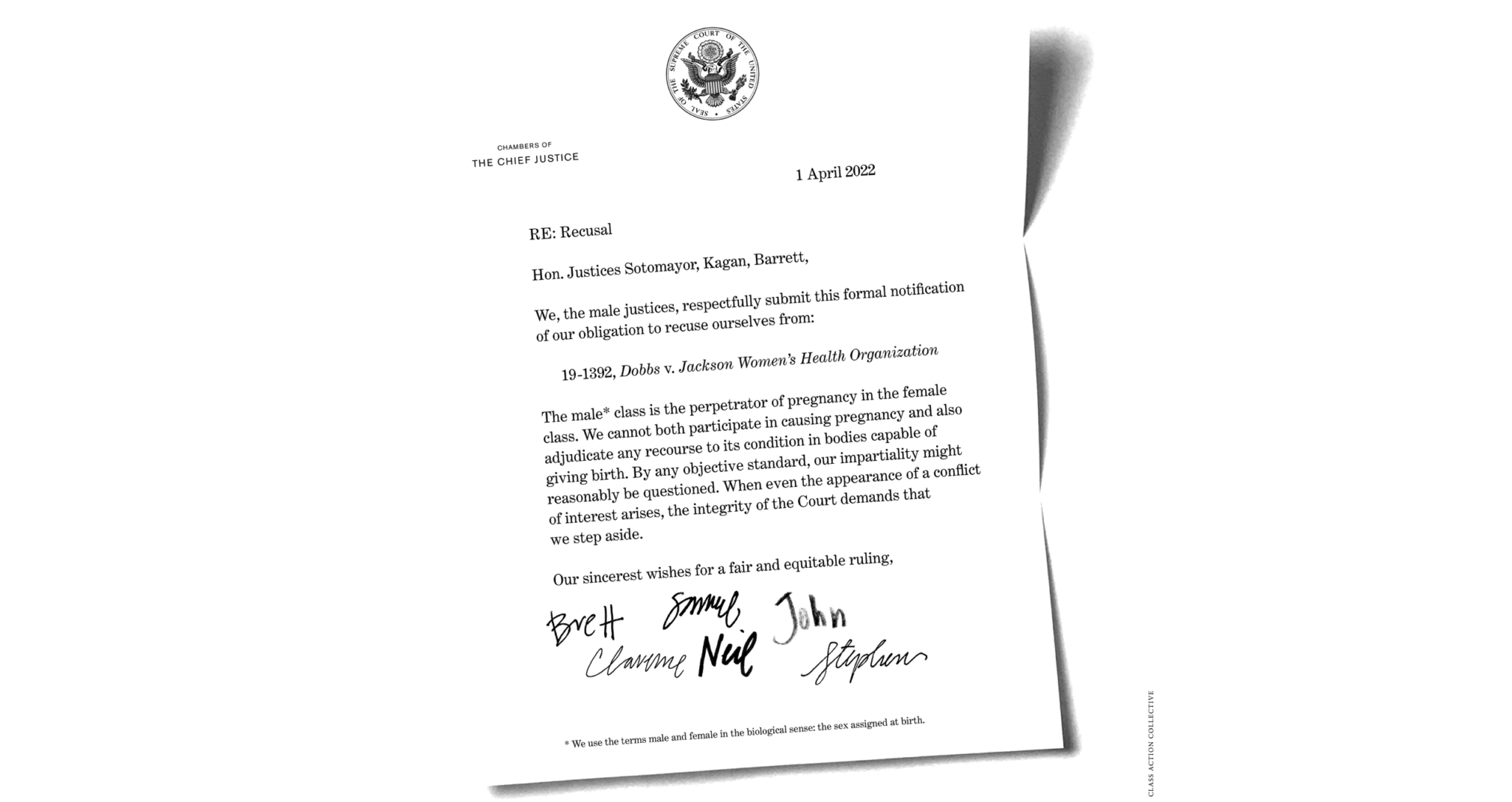Activist group posts satirical letter around Yale Law School
The Class Action Collective, composed of alumni from Yale and other schools, sent a satirical letter requesting male judges recuse themselves from an abortion case to the Supreme Court.

courtesy of www.classactioncollective.org
The Class Action Collective — an organization that uses visual messages to support social change — circulated a satirical letter in which male justices on the U.S. Supreme Court recused themselves from an ongoing case about abortion as an April Fools Day prank.
The letter — which featured the signatures of male justices John G. Roberts, Jr.; Clarence Thomas; Stephen G. Breyer; Samuel A. Alito, Jr.; Neil M. Gorsuch and Brett M. Kavanaugh — was addressed to the three female justices on the Court: Sonia Sotomayor, Elena Kagan and Amy Coney Barrett. The letter suggested that the male justices would recuse themselves from the ongoing Dobbs v. Jackson Women’s Health Organization case, which discusses the constitutionality of a Mississippi state law banning abortion after the first 15 weeks of pregnancy, as they cannot bear children themselves. The collective wrote and spread this satirical letter as part of their greater initiative to create visual messages to promote social change.
“I hope it makes people think and stop in their tracks and realize, ‘Oh, wait, the Supreme Court is mainly men who will never be pregnant making this decision about women’s bodies,’” said Julie Krishnaswami, law lecturer and Head of Research Instruction at the Yale Law School. “That’s a pretty simple idea to grasp. Hopefully more people will think that way.”
Members of this art collective, comprised of alumni from the Yale School of Art, worked to create the satirical letter that would be put up around social media, Yale’s campus and specifically, in the interior of the Law School.
“We, the male justices, respectfully submit this formal notification of our obligation to recuse ourselves from: 19-1392, Dobbs v. Jackson Women’s Health Organization,” the letter reads.
The letter goes on to state the reasons why the male class is the “perpetrator of pregnancy” within the female class. It says that the male justices cannot participate both in causing pregnancy and in “adjucat[ing] any recourse to its condition,” making them therefore “reasonably” question their impartiality in the case.
The satirical letter is then signed with all the male justices’ first names — an informal way of addressing themselves, as they are normally referred to with the title “Honorable Justice” followed by their full names.
The collective told the News that they used the first names of the male justices because “it just underscores the maleness of it, and the total imbalance.” The collective was trying to draw attention to the “formality of the language and the informality of what we were trying to suggest,” they said.
Krishnaswami is not a member of the collective but is an artist herself and helped the collective format the letter so that it resembled standard legal documents. She said that she specifically took inspiration and syntax from Powell’s writing in the Webster v. Doe case, Justice O’Connor’s correspondences between the White House and many law review articles on bias.
Krishnaswami said she wanted to find samples of “what interoffice communication looks like between justices” and mimic their level of formality.
“The thing about recusal in the Supreme Court is that there are no rules, there’s a statute of recusal that applies to federal appellate courts, but there’s no rules in the Supreme Court,” Krishnaswami said. “They set their own rules.”
The collective also pointed to the lack of a “code of ethics” for the court. They said that, even though the court does not currently prevent men from ruling on issues related to women’s bodies, that ethical standard “could be a possibility in the future.”
This specific letter has been published several times, specifically in the Provincetown Independent and on the widely known blog Design Observer. It was circulated in March, Women’s History Month and was again sent around on April Fools Day.
“Our faculty are practicing artists and designers with rich art practices outside of Yale,” Dean of the Yale School of Art Kymberly Pinder ’95 said. “Yale University, and the School of Art, is committed to the free expression of ideas and opinions by all members of its community, including views about political issues.”
The letter’s circulation in the beginning of April happened to coincide with a national discussion over the possible recusal of Justice Clarence Thomas in cases related to the Jan. 6 riot at the Capitol. Thomas’ wife, Ginni, is active in right-wing causes that may threaten his impartiality.
The collective said that the recent recusal talks surrounding Thomas are “perfect” for their project and help make their point “on another level.”
“How can they be impartial when they are humans and they live and see the world too?” Krishnaswami said.
The collective sent the letter to the Supreme Court and told the News that they hope someone will take notice of the letter’s formality — they specifically used “beautiful paper,” an appropriate stamp and other artistic and visual elements to grab the attention of the clerks who read letters addressed to the Court.
The collective said they hope to make “a powerful message that will have some sort of impact.”
The Yale School of Art is located at 1156 Chapel St.
Correction, April 13: This article has been updated to correct the spelling of Krishnaswami’s name and more accurately reflect the composition of the Class Action Collective.







